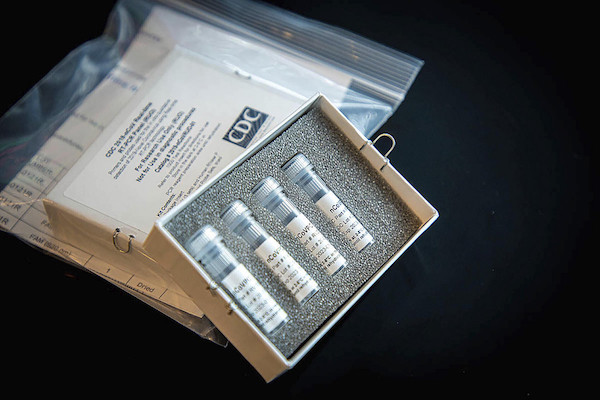Coronavirus Adds New Stress To Antiquated Health Record-Keeping
Delays getting test results could hinder efforts to track the number of coronavirus tests performed nationwide and the spread of the disease.
The U.S. health care system is on the leading edge of many technologies - except when it comes to passing information between doctors, laboratories, and public health officials. And that could add another snarl to the already troubled effort to test for coronavirus. Overreliance on faxing, phones and paper records is problem enough in ordinary times. Adding thousands of coronavirus tests a day will test the ability of providers, labs, and public health officials to keep track of all the results. Because not all results are automatically downloaded into physicians' records, the doctors may need to log into laboratory web portals or, if all else fails, turn to faxes and phones to learn test results.
 CDC laboratory test kit for the new coronavirus - CDCThe urgency of the problem was driven home by the CDC's decision last week to broadly expand testing for the coronavirus. Any American can request tests if a doctor suspects the virus, and people no longer need to show specific symptoms as the CDC had previously required. Delays getting test results could hinder efforts to track the number of coronavirus tests performed nationwide and the spread of the disease. HHS Secretary Alex Azar on Tuesday said his department is building an IT system to accomplish that task. But tech experts say it could have been accomplished by now if the medical system's tracking system weren't so antiquated.
CDC laboratory test kit for the new coronavirus - CDCThe urgency of the problem was driven home by the CDC's decision last week to broadly expand testing for the coronavirus. Any American can request tests if a doctor suspects the virus, and people no longer need to show specific symptoms as the CDC had previously required. Delays getting test results could hinder efforts to track the number of coronavirus tests performed nationwide and the spread of the disease. HHS Secretary Alex Azar on Tuesday said his department is building an IT system to accomplish that task. But tech experts say it could have been accomplished by now if the medical system's tracking system weren't so antiquated.
"There is no infrastructure in the USA for tracking the number of tests ordered for just about anything," said Brian Dixon, an informatics expert with Regenstrief Institute, a nonprofit health research organization. Dixon said that with private lab testing of coronavirus coming online, keeping track of the results will become much more difficult. "When state health labs and CDC run all the tests, they can monitor who and how many have been tested," he said. "Now that the test kits are in the wild, it is unknown." The experts point to both a lack of standards coordinating reporting for private labs and a lack of investment in public labs...
- Tags:
- American Medical Informatics Association (AMIA)
- antiquated health record-keeping
- Association of Public Health Laboratories (APHL)
- BioReference Laboratories
- Brian Dixon
- Centers for Disease Control (CDC)
- commercial testing labs
- coronavirus
- Coronavirus spread
- Coronavirus testing
- coronavirus tests performed nationwide
- COVID-19
- digitized testing
- Doctors on Demand
- Doug Fridsma
- Dwayne Breining
- early intervention
- electronic health records (EHRs)
- Emergency Preparedness and Response (EPR)
- emergent diseases
- health care system
- Health IT
- HITECH Act
- Indiana's health information exchange
- infectious disease outbreaks informatics projects in public health
- LabCorp
- laboratory web portals
- lack of investment in public labs
- lack of standards coordinating reporting
- local health departments
- Making Data Fly
- maternal mortality
- Mayo Clinic
- Michelle Meigs
- modernizing doctor-lab communications
- Northwell Health
- pattern recognition
- public health emergency response
- public health officials
- public health surveillance
- public health threats
- public labs infrastructure
- Quest Diagnostics
- Regenstrief Institute
- standards-based data exchange
- state health laboratories
- telehealth
- US Department of Health and Human Services (HHS)
- Login to post comments